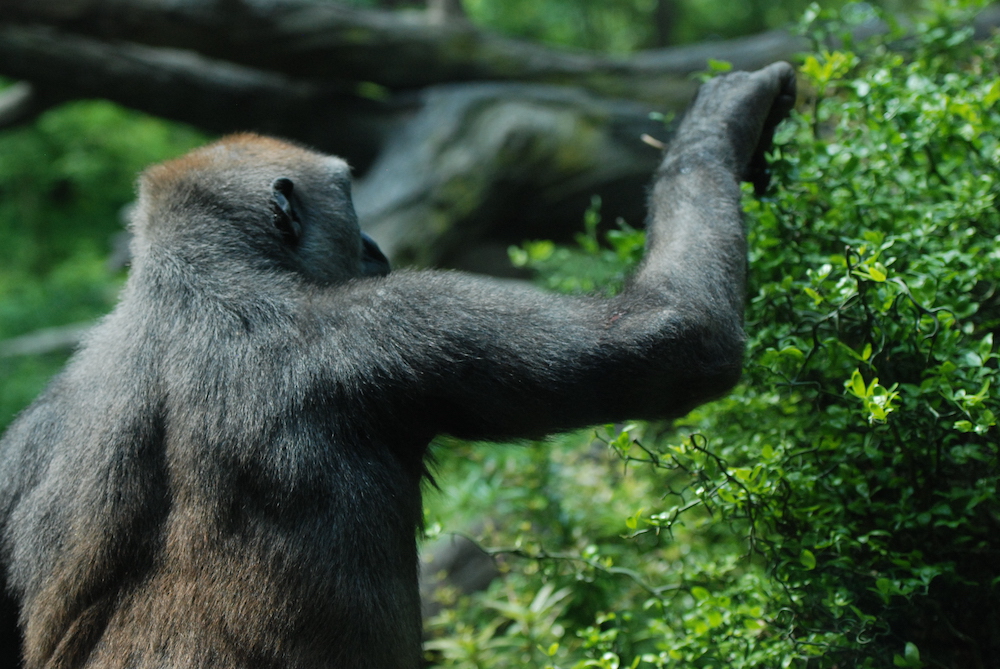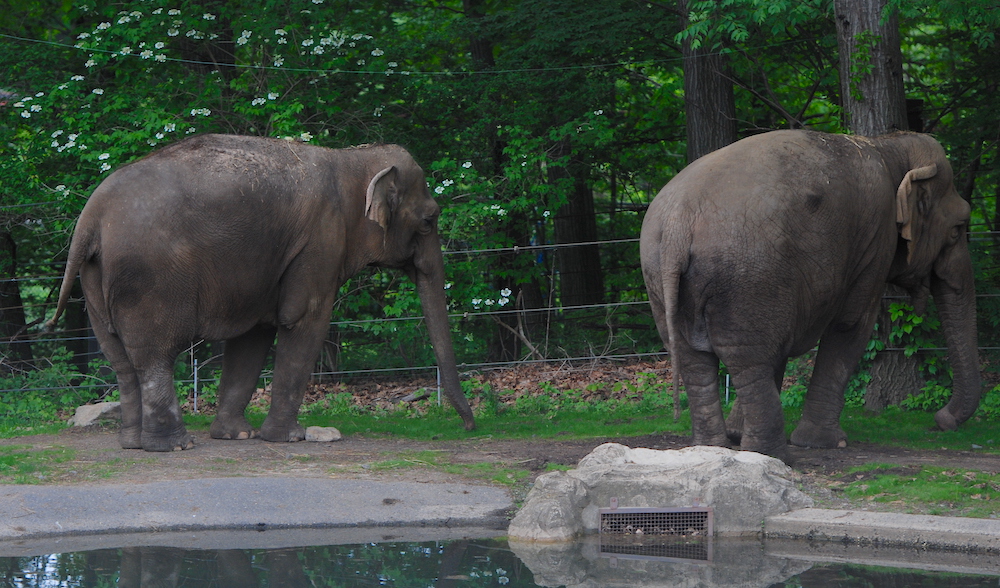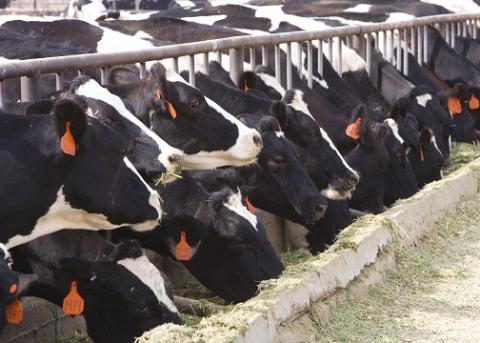
With their own inherent value quite apart from whatever good might come from our use of them, animals ought to be treated as the kinds of creatures they are. Image: A gorilla at The Bronx Zoo in New York City, May 23, 2014 (Flickr/Tammy Lo)
Over the past decade in Christian theological circles, there's been an explosion of concern for nonhuman animals. Not many people keep up with theological trends, so no shame if you've missed this one.
But the fact is, while much of theology is by its very nature rather abstract, this one is relatable: Large majorities of us have animal companions, for instance. We all eat, and many of us think, talk and even obsess over what we eat more than we do over, say, God. And how we treat animals has a lot to do with what we put in our bodies — and not just to eat.
In addition, the debate over nonhuman animals features some fireworks.
Catholic theologian John Berkman, a brave light in the darkness on this issue, has chosen to focus his work on animals despite threats from his bosses at the Catholic University of America that they would deny him tenure. Berkman now teaches moral theology at Regis College at the University of Toronto, and under his direction graduate students (such as Allison Covey) are writing dissertations on animal theology.
There are other pioneering figures in this space: Andrew Linzey, to name one, and David Clough, another. Clough, perhaps the most important voice in the field in the last decade, set the standard for theological scholarship with his 2018 two-volume book. Celia Deane-Drummond, previously a moral theologian at the University of Notre Dame, has started the Laudato Si' Research Institute at the University of Oxford in the United Kingdom.
Recently, Deane-Drummond, Berkman and I collaborated on a special issue of the Journal of Moral Theology, the first-ever Catholic theology journal to devote an entire issue to nonhuman animals. Since then, the Rev. Christopher Steck of Georgetown University published "All God's Animals: A Catholic Theological Framework for Animal Ethics," cementing the topic as absolutely essential to Catholic moral theology.
Advertisement
But it is the real-world, public work that is putting the issue of the treatment and dignity of animals in play. Clough's Farm Forward project is really exciting and unparalleled. A few months ago, I got a note from the Nonhuman Rights Project, asking if I'd be interested in helping organize an amicus brief from Catholic theologians in support of the project's legal attempts to free Happy the Elephant from captivity in the Bronx Zoo. I was delighted, and the brief — signed by Berkman, Covey, Deane-Drummond, Steck and me — was published and sent to the New York Court of Appeals this past February.
In it, we made the general argument that, especially in the biblical tradition shared both by Jews and Christians, God's creation is not made for human beings. On the contrary, in the first chapter of the Bible's first book, Genesis, God pronounces multiple aspects of creation "good" in themselves before human beings are even created.
Nearly all theologians now agree that the biblical dominion God has given human beings over creation is not a license to use and dominate, but rather a command to be caretakers and stewards.
We are akin to viceroys ruling on behalf of a sovereign and according to that sovereign's wishes. God, sovereign of the universe, reveals through Scripture a design for what theologians call a "peaceable kingdom," one that includes nonviolent relationships between human beings and nonhuman animals.

Asian elephants at The Bronx Zoo, New York City, May 23, 2014 (Flickr/Tammy Lo)
And then we applied that general argument to Happy, a 49-year-old pachyderm, who is not a thing for us to confine, use and put on display in a zoo (even in an attempt to produce a good outcome), but rather a particular kind of creature whom God made to flourish.
Happy cannot flourish as this kind of creature while captive in the Bronx Zoo. She would be significantly better able to become the kind of creature God made her to be in a sanctuary.
Nonhuman animals like Happy have been created to fit into a particular place within the order of God's creation, an order that human beings are bound to respect.
While waiting for the legal process surrounding Happy's fate to unfold, I got an email from the chair of a special committee of the National Academy of Sciences asking for my views as a Catholic moral theologian on whether certain biomedical research being considered on nonhuman animals was morally acceptable.
Nearly all theologians now agree that the biblical dominion God has given human beings over creation is not a license to use and dominate, but rather a command to be caretakers and stewards.
In light of the terrible toll neurological diseases such as dementia have taken (a toll on which the pandemic has shone a spotlight), researchers are eager to find something, anything, that could lead to our defeating them. But one significant proposal being put forward — growing human neurological tissue in nonhuman animals to better study the human disease model — goes a step too far.
In a virtual meeting with the National Academy of Sciences' committee, I argued that the leading voices in animal ethics today — religious and secular — reject the idea that nonhuman animals are mere tools. With their own inherent value quite apart from whatever good might come from our use of them, animals ought to be treated as the kinds of creatures they are. No matter its benefits, research that grows cells in other animals is an obvious violation of our duties.
Whether certain animals have legal rights not to be confined in zoos or whether we will create neuro-hybrids of human and nonhuman animals are big enough issues on their own. But in the end you may simply not care about other species. Whether or not we treat animals as the kinds of creatures God made them to be may not be your thing.

Confined cattle feeding operation in a ranch in California, Dec. 10, 2010 (Flickr/U.S Department of Agriculture)
The fate of humans, however, also depends on how we treat animals. There is simply no way we will ever reverse global climate change without dismantling the massive factory-farms that treat animals as "protein units per square foot" rather than as animals with their own inherent dignity. These farms are one of the most significant contributors to global climate change.
If we use them for food at all, humans' existence requires that we care for animals on smaller farms where they are permitted to live out their lives in accordance with God's plan.
So, yes, respecting God's plan for nonhuman animals is more relevant than it has ever been. The very fate of our species depends on it.
[Charles C. Camosy is associate professor of theological and social ethics at Fordham University and a frequent contributor to Religion News Service.]






